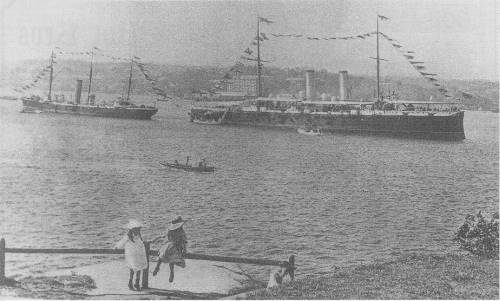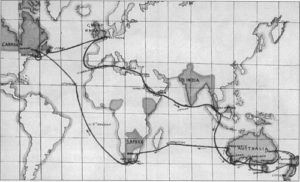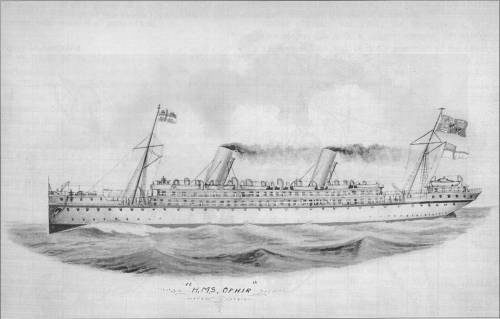- Author
- Ogle, Brian
- Subjects
- History - general
- Tags
-
- RAN Ships
- None noted.
- Publication
- March 2001 edition of the Naval Historical Review (all rights reserved)
Events of one hundred years ago when the first Commonwealth Parliament was opened by George, Duke of Cornwall and York, in Melbourne, on a stopover during the Royal Tour around the Empire are fully and faithfully recorded in a most unusual manner. The Duke and Duchess travelled in HMS Ophir and the cruise was detailed in handwritten, illustrated diary form by one of the crew, Petty Officer Harry Price. Being a lower deck account it has a more human or spontaneous impact than the generally ponderous reports of the period.
The work is fascinating not only in its historical content but also in the distinctive clarity of calligraphy and illustration. So interesting as to be facsimiled in 1980, decades later, and published by Webb and Bower of Exeter as a 200-page hard bound book printed on a heavy buff parchment-type stock most sympathetic to the subject.
The Author
Harry Price (1877-1965) entered the Royal Navy as a Boy 2nd Class in 1893, rising to P.O. in 1901, when he joined HMS Ophir. Price had a natural artistic talent which was recognised by the Birmingham School of Art before he enlisted. His Service Certificate shows that he was somewhat of a “chook” being disrated to Leading Seaman in Donegal in February, 1904, thence in April 1904, back to AB.
When his twelve years were up in 1907 he travelled the world living on his artistic talent until August 1914 when called up from the fleet reserve, serving in World War I in five ships, as an AB, until 1919. Three of these ships including Ocean and Majestic were sunk within nine months with Price, also a magnificent swimmer, 14 hours in the water ex Majestic. Withal he survived until demobbed with the award of D.S.M.
For 50 more years Price made his mark as an artist and as a naturalist collecting, classifying and photographing birds and butterflies. As well, he was acknowledged the finest angler on the rivers

of Devon. His fishing diaries covering 40 years are as remarkable as his account of The Cruise of HMS Ophir – a book worthy of a place in any sea-goer’s library.
The Ship
One gathers by inference that Ophir was requisitioned out of one of the merchant lines (one of our members may be able to verify). Commissioned at Tilbury on 26th February 1901 she had the following complement:
125 bluejackets, 100 marines, 37 bandsmen, 20 boys, 7 engineer officers, 88 stokers, 2 pursers, 50 stewards, 9 cooks, 3 bakers, 2 butchers, 1 laundry man and wife, 1 printer and 2 barbers. The captain was Commodore A.L. Winsloe with 21 officers. Add an extensive royal entourage and the ship’s complement was about 525.
HMS Ophir for the particularisers, was 482 ft in length, 52’6″ beam, 37 ft depth, gross register 6910 tons, 10,000 H.P. All measurements are imperial which was what the world was all about in 1901.
The “Cruise of HMS Ophir” took place at the time when Britain was at the height of its world power. The ship sailed via the “all-red” route – seaports strategically occupied as coaling stations in an Empire controlled by Whitehall but policed by the Royal Navy.
The extent of the R.N. in number, variety and distribution is made evident in this account as is the huge consumption of coal, its lifeblood in 1901. Ophir alone took on “hundreds of tons” in Portsmouth, Port Said, Colombo, Singapore, Sydney, Albany, Mauritius (1110 tons quoted), Capetown 1200, Halifax 1800. One ship, thousands of tons of coal; the volume consumed by the hundreds of ships, naval and merchant, is mind-boggling.
Girding Up the Imperial Loins

The all-important reason for this 40,000 sea miles tour, sailed around the globe from March 1st to October 31st 1901 (7 months) was the death of Queen Victoria on January 22nd, 1901. For 63 years she had been personified and promulgated as “The Great White Mother” who lived only to love and protect her multitude of subjects. Red and yellow, black and white, all were precious in her sight. Now the colonials had to be introduced to the “Great King”.
To quote Prince George in his speech to Indian chiefs, gathered in Ontario:- “The Indian is a true man, his words are true words and he never breaks faith. He knows that it is the same with the new “Great King”. His promises are as long as the sun shall shine and the waters flow, care will ever be taken of you.”
Bull Herd, chief of the Sarcees and spokesman for the tribes drew attention to the deprivations caused by the white man’s “reckless slaughter” of the bison and ended the dialogue with these words:
“All our people want is plenty of grub to make them feel happy before they start for home.” An eminently reasonable request after enduring such a plethora of Blarney.

Similar speeches, edited to suit the peculiarities of the natives, were made at all ports of call.




